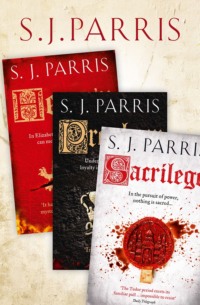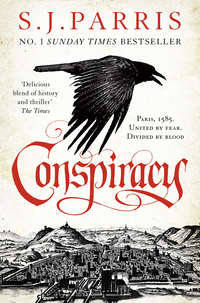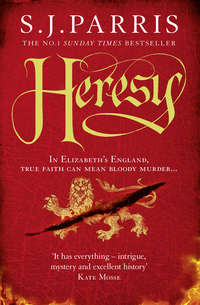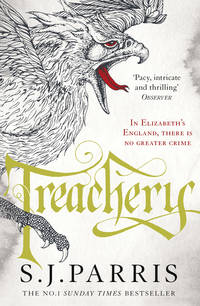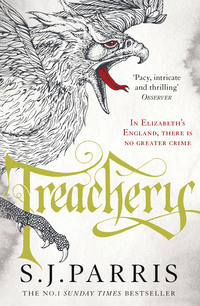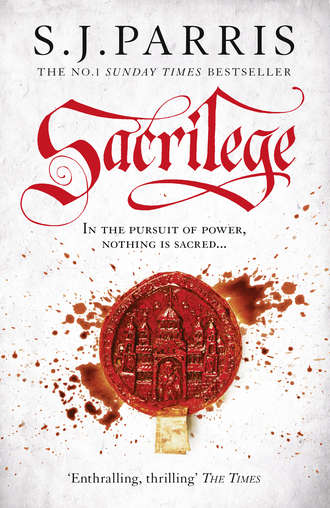
Полная версия
Sacrilege
His cap had come off in the tussle but he pressed his face into the grass; I grasped him roughly by the hair and pulled his head up so that I could see his face. I was not sure which of us cried out the louder.
‘Gésu Cristo! Sophia?’ I looked down, incredulous, into the face of the girl I had known, and briefly fancied myself in love with, more than a year ago in Oxford. I barely recognised her, and not just because her hair was cut short like a boy’s. She had grown so thin that all the bones of her face seemed sharper, and those wide tawny eyes that had been so bewitching were now ringed with dark circles. She muttered something I couldn’t make out, and I leaned closer.
‘What?’
‘Get off my hair,’ she hissed, through her teeth.
Startled, I realised I was still gripping her hair in my fist. I released her and her head sank back to the grass, as if it were too heavy to hold up.
‘Sophia Underhill,’ I repeated in a whisper, hardly daring to speak her name aloud in case she should vanish. ‘What the Devil …?’
She twisted her face to look up at me, blinked sadly and looked away.
‘No. Sophia Underhill is dead.’
TWO
We walked side by side down Long Lane towards Smithfield Market. She said nothing, her boy’s cap pulled low over her eyes once more, and I did not press her. She seemed so dramatically altered since I had last seen her, waving goodbye to me from an upstairs window in her father’s lodgings, that I could only guess at the circumstances that might have brought her to London in such a state. But I knew that bombarding her with questions would be the surest way to make her retreat from me. I stole a sideways glance as we walked in search of a tavern; her beauty seemed undiminished, even enhanced by her gauntness, because it lent her an air of fragility. I had to remind myself that in Oxford Sophia had not shared my feelings; her heart had been entangled elsewhere. Yet she had come to London to seek me out, or so it appeared. I could only be patient and wait to hear her story, if she was inclined to tell it.
As we neared the marketplace, the bleating and bellowing of livestock rose into the air with the sharp tang of animal dung, fermenting in the heat. Fear of plague had not stopped the business of commerce here, and we made our way around the edge of the pens where cattle and sheep jostled in their confinement and pressed up to the fences, snuffling frantically, while farmers and butchers bartered and haggled over prices. Sophia covered her mouth and nose with her sleeve as we passed the animals; I was more intent on watching where I was putting my feet. At the entrance to St Sepulchre’s Lane, which the market traders called Pie Corner, gaudy painted tavern signs hung from the houses and a couple of girls waited listlessly in the shade, trays of sweating pies slung around their necks. I indicated the tavern on the corner, under the sign of the Cross Keys. On the threshold, Sophia hesitated and laid a hand on my arm.
‘My name is Kit,’ she whispered. ‘I am come to London to look for work, if anyone asks.’
I stopped, my hand on the door, and stared at her, searching her face. These were the first words she had spoken since announcing her own death in the churchyard. She looked back at me with earnest eyes and in that moment I recognised her haunted, fugitive look and cursed myself for being so stupid. She was on the run from something, or someone; this was why she was disguised as a boy. I knew that look only too well; once I had spent three years travelling through Italy under a different name. I understood what it meant to be a fugitive: always moving on, never trusting a soul, never knowing if the next town where you stopped for food or shelter might be the place they finally caught up with you. I nodded briefly, and held the door open for her.
‘Well, come on then, Kit. You look as if you need feeding up.’
The tavern was a functional place, catering for the needs of the market traders; the tap-room smelled as strongly of animals as the square outside, but I found the corner of a bench by a window and ordered some barley bread and a jug of ale. I leaned back against the wall and watched Sophia as she hunched into herself, tugging her dirty cap further down and glancing around nervously. When the bread arrived, she tore into it as if she had not eaten in some time. I sipped my ale slowly and waited for her to speak.
‘Forgive me,’ she said with her mouth full, wiping crumbs away with the back of her hand. ‘I have forgotten all my manners, as you see. Whatever would my father say?’
There was no mistaking the bitterness in her tone. Her father, the Rector of Lincoln College, had disowned her when he discovered she was with child, and sent her to live with an aunt in Kent; this was the last I had heard of her. When I left Oxford she had given me the aunt’s address and asked me to write, but I had never received any reply.
‘I wrote to you,’ I said, eventually. She looked up and met my gaze.
‘I wondered if you did. I had no letters. I expect she burned them all.’ Her voice was flat, as if this no longer mattered.
‘Your aunt?’
She nodded.
‘Do you hear from your parents?’
She stared at me for a moment, then gave a snort of laughter.
‘You are joking, I suppose?’
I both wanted and did not want to ask her about the child. She would have expected it in November, so it must be eight months old by now. If it had lived.
‘Why did you say you were dead?’ I asked, when it became apparent that she was not going to elaborate. She gestured to her clothes.
‘Look at me. This is who I am now. The girl you think of as Sophia Underhill no longer exists. She was a fool anyway,’ she added, with venom. ‘A naïve fool, who believed that books and love were all she needed in life. I am glad she is dead. Kit has no such illusions.’
I was shocked by the force of grief and anger in her words, but on reflection I should not have been. She was only twenty and already life had dealt her some cruel blows: her beloved brother had died young, the father of her child was also dead, and her family had abandoned her. A sudden image flashed into my mind, of Sophia running towards me across a garden in Oxford, her long chestnut hair flying out behind her, laughing, eyes bright, hitching up the skirts of her blue dress as she ran. She had been well educated, beyond what was expected of a young woman of her status; her father had planned a respectable marriage for her. But her independent spirit and determination to shape her own life had brought her, in the end, to this.
‘You didn’t need to skulk around in the shadows after me, you know,’ I said gently, as she ripped into another hunk of bread. ‘You could have just knocked on my door.’
‘On the door of the French embassy? You think they would have received me? Invited me to dinner, perhaps?’ She swallowed her mouthful and fixed her eyes on the table. ‘In any case, I didn’t know if you would want to see me. After everything that happened.’ She did not look at me, and her words were barely audible, the scorn melted away. ‘I told you, I never had any letters from you. I wanted to find out about your situation before I made myself known. I – I was afraid you might not want to know me.’
‘Sophia –’ It took a supreme effort of self-control not to reach across the table and take her hand in mine. The ferocity of her warning look confirmed that this would not have been welcome. I was finding it difficult to remember that she was supposed to be a boy. ‘Sorry – Kit. Of course I would not have turned you away. Whatever help you need – if it is in my power to give –’
‘You might feel differently when you know the truth,’ she mumbled, picking at a splinter of wood on the tabletop.
I leaned closer.
‘And what is the truth?’
She looked up and met my eye with a flash of her old defiance.
‘I am wanted for murder.’
A long silence followed, filled by the clatter and hubbub of the tap-room and the farmyard noises and shouts from beyond the window. Motes of dust rose and fell in the sunlight that slanted across our end of the table. I continued to stare at Sophia and she did not look away; indeed, I could swear there was a hint of a smile playing at the corners of her mouth. She seemed pleased with the effect of her announcement.
‘Who did you murder?’ I asked, when I could bear the silence no longer.
‘My husband,’ she replied, without hesitation.
‘Your husband?’
She smiled briefly. It did not touch her eyes.
‘Yes. You did not know I’d got myself a husband, did you?’
I could only go on staring in amazement.
‘You are thinking that I don’t waste any time, eh? Barely finished pushing out one man’s child before I’ve married another?’
‘I thought no such thing,’ I said, uncomfortably, because the idea had fleetingly crossed my mind.
‘My aunt sold me like a piece of livestock.’ She gestured towards the window. ‘Like one of those poor bleating beggars in the pens.’
‘So you murdered him?’ In my efforts to keep my voice down, it came out as a strangled squeak.
Sophia rolled her eyes.
‘No, Bruno. I did not. But someone did.’
‘Then who?’
This time she could not disguise the impatience in her voice.
‘I don’t know, do I? That’s what I want to find out.’
I shook my head, as if to clear it. ‘Perhaps you had better tell me this story from the beginning.’
She nodded, then drained her tankard and pushed it towards me. The ale was not strong, but drinking it fast had brought a flush of colour to her hollow cheeks.
‘I’ll need another drink first.’
‘There is no use in dwelling on all that happened before you left Oxford,’ she began, when a fresh jug of ale had been brought and she had finished a second piece of bread. I muttered agreement, avoiding her eye. I wondered if she remembered the night I had kissed her, or if that memory was buried in all that had happened after. I remembered it still, as sharply as if it had been a moment ago.
‘My father sent me away to my aunt in Kent, as you know. My mother cried when I left and promised it was only for a season, until my disgrace, as she put it, was past, but I could see by my father’s face that she was fooling herself. The stain to his reputation and his standing in the town was more than his pride could bear. I truly believe he would rather I had died than brought him a bastard grandchild.’
‘He as good as said so to me,’ I recalled.
‘Well, then. I was under no illusion when I set out to Kent in the company of one of my father’s servants. I had been cast off by my family for good and I had no idea what my future was to hold. It was several days hard riding and I was near four months with the child by then. I was ill the whole way and I feared …’ She looked down at the table, suddenly bashful. ‘I knew so little of such matters, I feared the rough journey would dislodge it before its time. Stupid.’ She shook her head, embarrassed.
‘Not at all,’ I said. ‘It would be an unnatural woman who did not worry about the safety of her unborn child.’
‘It turns out they are tougher than you think, these creatures,’ she said, allowing herself a soft smile. ‘In any event, I was safely delivered to my aunt – my father’s elder sister, so you may imagine she took the insult to his honour very much to heart. She was widowed, with modestly comfortable means, and she made sure that I was adequately fed and housed for the duration of my confinement. But it came at a price. The state of my immortal soul was her real project.’ She grimaced, and paused to take another gulp of ale. ‘I was allowed no books except the Bible and a book of prayer. Naturally, I was not permitted to step outside the house – she had told her neighbours that I was sickly and likely to die and that she was nursing me through my last months. Whether they believed her, I have no idea, but I was shut in my room whenever she had visitors.’
‘You were not moved to any religious feeling, despite your aunt’s efforts?’
She snorted and tossed her head in a way that reminded of how she was before, when she still had long hair to toss.
‘I told you, Bruno – I am done with religion, of any stripe. If there is a God, I am sure He must look with despair on His representatives, endlessly bickering over trifles. For myself, I would rather live without it.’
‘That makes you a heretic,’ I said, suppressing a smile.
She shrugged.
‘If you say so. It does not seem to have done you any harm.’
‘Oh, Sophia. Sorry – Kit. How can you say that? Do not take me as your model. I can never return to my home because I am called a heretic, you know this.’
‘Neither can I,’ she said, pointedly. ‘We are in the same boat, you and I, Bruno. We both live in exile now.’
I was tempted to detail for her all the ways in which our situations could not be compared, but I wanted to hear the rest of her story.
‘So your aunt was determined to make you repent …?’
‘I never knew how much my father had told her of the circumstances that brought me to her house. She was certainly of the belief that I had been wilful and disobedient and had made my long-suffering family pay the price for my dishonour. And she made it very clear that I would have no choice about the life I lived from then on, if I expected to be given food and shelter.’ She stopped abruptly, looked away to the window and swallowed hard. I sensed we were nearing the heart of her story; she had kept up the careless bravado convincingly so far, but I noticed she had barely mentioned the child. Perhaps she found it too painful to talk about.
‘Her plan was this,’ she continued, when she had taken another drink. ‘That I should wait out my confinement in her house, hidden away, stuffing my head with Bible verses day and night. Then, when the child was born, if it was healthy and a boy, it would be adopted by a couple of some standing in a neighbouring town who could not have a child of their own. She had it all worked out, it seems, and I am certain that money changed hands, though I never saw a penny of it. But she was very insistent that a boy would be the best outcome for all concerned – as if I could influence what was in my belly.’
‘And if it was a girl?’
‘I suppose they would have found a place for her, somewhere. There’d have been less reward, though.’
‘But it was a boy?’
Finally she looked up and met my eye.
‘Yes. I had a son. And he was healthy – so I was told. I only held him for a few minutes. They didn’t even let me nurse him. She said it was best that my body did not get used to him, nor him to me. Someone came at night to take him away, under cover of darkness. Those people – the people that bought him – they had a wet nurse ready, I’m told. So I’m sure he was well looked after.’
Here her voice cracked a little; I wanted desperately to reach out for her hand, but she held herself proud and upright, and simply clenched her jaw together until the danger of showing emotion had passed.
‘I don’t remember much about those days, to tell you the truth, Bruno. I was in a lot of pain while my body recovered from the birth, but that was nothing compared to the blackness that descended on me after they took him away. I had always believed I was someone who could bear grief with fortitude – I had done so in the past – but this was different. I could not eat or sleep nor even cry. All I was good for was lying on my bed, staring at the ceiling and wishing it would all come to an end somehow. At first my aunt was terrified I had taken an infection and would die – she had the physician out to me every day, at her own expense, and she had to pay extra for his discretion. I foolishly imagined she was doing this out of genuine concern and a sense of family duty.’
‘It must have been terrible.’
She shrugged again.
‘I suppose it was. But I had reached a point where I no longer cared what happened to me. I could feel nothing – not hope, nor fear, nor anger. Only blankness. I thought my life was over. I might as well have taken my chances being drowned on a boat to France.’
She held my gaze steadily as she said this, and although she had spoken the words gently, they cut to my heart. The previous spring, Sophia had been all set to flee Oxford for the Continent; it was my actions that had prevented her. I had intervened because I believed – with good reason, I still felt – that by stopping her flight I was saving her life, and that of her child. Over the months since then I had thought of her often and wondered how her life had unfolded as a result of my interference; I remained sure that I had done the right thing, but there was always room for a sliver of doubt. I feared, however, that even now she clung to her romantic hopes, and blamed me for stealing from her the future she had planned.
‘But then your child would not have lived,’ I said softly.
She lowered her eyes and picked another splinter from the tabletop.
‘True enough. And he is alive and well, somewhere, I trust. I hope they are kind people,’ she added, with sudden force. ‘I wish I could have seen them, to know what they are like.’ Her voice shook again, and she wiped her eye brusquely with her sleeve.
‘They must have wanted a child very badly, whoever they were. I’m sure they will treat him like a little prince.’
She looked up, her lashes bright with tears, and forced a smile.
‘Yes. I’m sure you are right. So I lay there in the dark, day after day, until eventually the bleeding stopped and the milk dried up, and my body was my own again. I’m sorry if this detail offends you, Bruno, but it is a messy and unpleasant business, being a woman.’
I spread my hands out, palms upward.
‘It is difficult to offend me. But I am sorry to hear you suffered.’
She watched me for a moment, her expression guarded. Did she blame me for her suffering?
‘The physician came and bled me daily, which only made me weaker, but he could find nothing wrong. Of course, once my aunt was satisfied that I had no bodily affliction, she concluded it was just monstrous idleness and warned me repeatedly that as soon as I was able I would be expected to take on some of the household chores. Hard work was the best cure for melancholy, in her view.’ The note of bitterness had crept back. She took a deep breath, steadied herself, and continued. ‘One morning I woke – I think it was around the feast of St Nicholas – with the sun streaming in through the shutters, and for the first time in weeks I felt like getting up. It was still early and the household was asleep, so I put on some clothes, wrapped myself in a woollen cloak and went outside. My aunt lived on the outskirts of a small town with rolling countryside all around, and in the early morning sun, all laced with frost, the view was so beautiful it took my breath away. I walked for an hour, got myself lost a couple of times, but although I almost wore out my poor exhausted body, I felt I was coming back to life.’ She smiled briefly at the recollection. ‘My aunt was furious when I returned – I think she feared I’d run away. She railed at me: what if the neighbours had seen me in that state, looking like some wild woman of the woods? She had a point; I had not washed in weeks and I was thin as a wraith. In any case, she made me undress and looked me over thoroughly, as you would with a horse, then she heated water to bathe me and spent a long time untangling my hair and washing it with camomile. I was surprised, as you might imagine – she was not usually given to such extravagance. She fed me well that evening and told me I was welcome to walk in the countryside if I chose, so long as I stayed away from the town and one of her housemaids accompanied me. So over the next few weeks, this is what happened. I recovered my strength, and something of the balance of my mind, or at least I learned to lock away my pain where it could not be seen and appear human again on the surface. But I was suspicious of my aunt’s changed attitude – she seemed almost indulgent towards me, and I knew enough of her to doubt that this was prompted by affection. She had also taken to locking me in my room at night.’
‘What happened to the household chores she had threatened?’
‘Naturally, I wondered. Until the child was born, I was protected, because they needed me. I had tried not to think too much about what my life would be once I’d served my purpose – I supposed that at best she would use me as some kind of cheap servant in return for a roof over my head. I expected her to hand me a broom the moment I was on my feet again, but instead, she started coming to my room in the evenings to comb out my hair – it was still long then,’ she said, rubbing self-consciously at the back of her neck – ‘and smooth scented oil into my hands. Not what you’d usually do for someone you mean to do laundry or wash floors.’
‘She had something else in mind.’
Sophia nodded, her mouth set in a grim line.
‘I found out a few days before Christmas. She came into my room one morning with a blue gown. It was beautiful – the sort of thing I used to wear …’ She broke off, turning away.
I remembered how she used to dress in Oxford; her clothes were not expensive or showy, but she wore them with a natural grace that cannot be purchased from a tailor, and always managed to look elegant. Very different from the dirty breeches, worn leather jerkin and riding boots she was dressed in now.
‘I hadn’t thought I cared about such trifles any more,’ she continued, ‘but when she laid it out on the bed, I couldn’t conceal my pleasure. She told me it was an early Christmas present, and for a moment I really thought I had misjudged her, that there was a buried vein of human kindness under that crusty surface. I was soon disabused of that, of course.’
I was about to reply when the serving girl appeared at our table to enquire whether we wanted any more of anything. I asked for cold meat, more bread and another jug of ale; Sophia’s tale clearly demanded some effort and I felt she should keep her strength up. When the food had been brought and she had helped herself to the cold beef, she wiped her mouth on her sleeve and resumed her story.
‘She made me put the dress on and turn around for her. She seemed satisfied with the result. When she had pinched my cheeks hard to put colour in them, she stood back, looked me up and down and said, “You shall do very well, as long as you keep your mouth shut. Only speak if he asks you a question, and then make sure it’s a ‘Yes, sir’ or a ‘No, sir’. Understood?” When I asked who she meant, she merely tutted and shoved her sour old face right up to mine. “Your husband,” she said.’
‘I imagine you took that well,’ I said, breaking off a piece of bread, a smile at the corner of my lips.
‘I screamed blue murder,’ Sophia said, a grin unexpectedly lighting her face. ‘I’d have bolted if she hadn’t locked the door. As it was, she had to slap me around the face twice before I would be quiet. Then she sat me down on the bed and made me listen. “Do you know what you are?” she asked me. “You’re a filthy whore, that’s what, with no respect for God nor your family. Plenty in your situation have no one to look out for them, and they end up making their living on the streets, which is no more than you deserve. But you can thank Providence that I have found a better arrangement for you. A decent man, respectable, with a good income, has agreed to take you to wife. You can change your name and leave your whole history behind you. You’re still young and can be made to look pretty. All you have to do is be obedient and dutiful, as a wife should be. If you’d learned those qualities as a daughter, your life might have been very different now,” she added, just to twist the knife. “What if I don’t like him?” I asked. She slapped me again. “It’s not for you to like or dislike, hussy,” she said. “You can marry Sir Edward Kingsley and live in comfort, with the good regard of society, or you can make your own way. Beg for bread or whore for it, I care not. Because if you mar this on purpose, girl, after everything I have done for you, don’t expect me to feed and clothe you for one day more.” So saying, she locked me in the room and told me I had until the afternoon to make my choice.’



